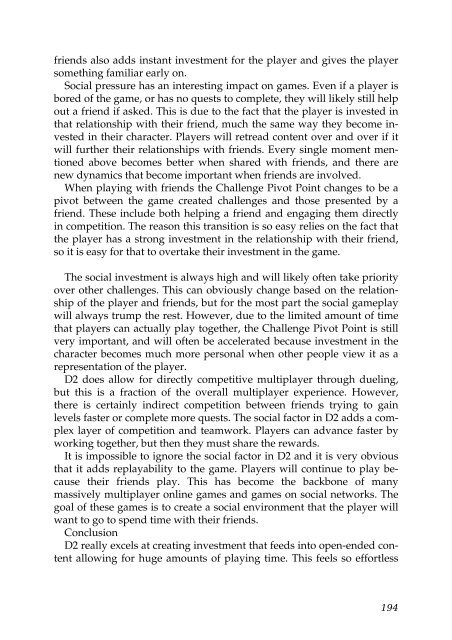Well Played 2.0: Video Games, Value and Meaning - OpenLibra
Well Played 2.0: Video Games, Value and Meaning - OpenLibra
Well Played 2.0: Video Games, Value and Meaning - OpenLibra
You also want an ePaper? Increase the reach of your titles
YUMPU automatically turns print PDFs into web optimized ePapers that Google loves.
friends also adds instant investment for the player <strong>and</strong> gives the player<br />
something familiar early on.<br />
Social pressure has an interesting impact on games. Even if a player is<br />
bored of the game, or has no quests to complete, they will likely still help<br />
out a friend if asked. This is due to the fact that the player is invested in<br />
that relationship with their friend, much the same way they become invested<br />
in their character. Players will retread content over <strong>and</strong> over if it<br />
will further their relationships with friends. Every single moment mentioned<br />
above becomes better when shared with friends, <strong>and</strong> there are<br />
new dynamics that become important when friends are involved.<br />
When playing with friends the Challenge Pivot Point changes to be a<br />
pivot between the game created challenges <strong>and</strong> those presented by a<br />
friend. These include both helping a friend <strong>and</strong> engaging them directly<br />
in competition. The reason this transition is so easy relies on the fact that<br />
the player has a strong investment in the relationship with their friend,<br />
so it is easy for that to overtake their investment in the game.<br />
The social investment is always high <strong>and</strong> will likely often take priority<br />
over other challenges. This can obviously change based on the relationship<br />
of the player <strong>and</strong> friends, but for the most part the social gameplay<br />
will always trump the rest. However, due to the limited amount of time<br />
that players can actually play together, the Challenge Pivot Point is still<br />
very important, <strong>and</strong> will often be accelerated because investment in the<br />
character becomes much more personal when other people view it as a<br />
representation of the player.<br />
D2 does allow for directly competitive multiplayer through dueling,<br />
but this is a fraction of the overall multiplayer experience. However,<br />
there is certainly indirect competition between friends trying to gain<br />
levels faster or complete more quests. The social factor in D2 adds a complex<br />
layer of competition <strong>and</strong> teamwork. Players can advance faster by<br />
working together, but then they must share the rewards.<br />
It is impossible to ignore the social factor in D2 <strong>and</strong> it is very obvious<br />
that it adds replayability to the game. Players will continue to play because<br />
their friends play. This has become the backbone of many<br />
massively multiplayer online games <strong>and</strong> games on social networks. The<br />
goal of these games is to create a social environment that the player will<br />
want to go to spend time with their friends.<br />
Conclusion<br />
D2 really excels at creating investment that feeds into open-ended content<br />
allowing for huge amounts of playing time. This feels so effortless<br />
194

















